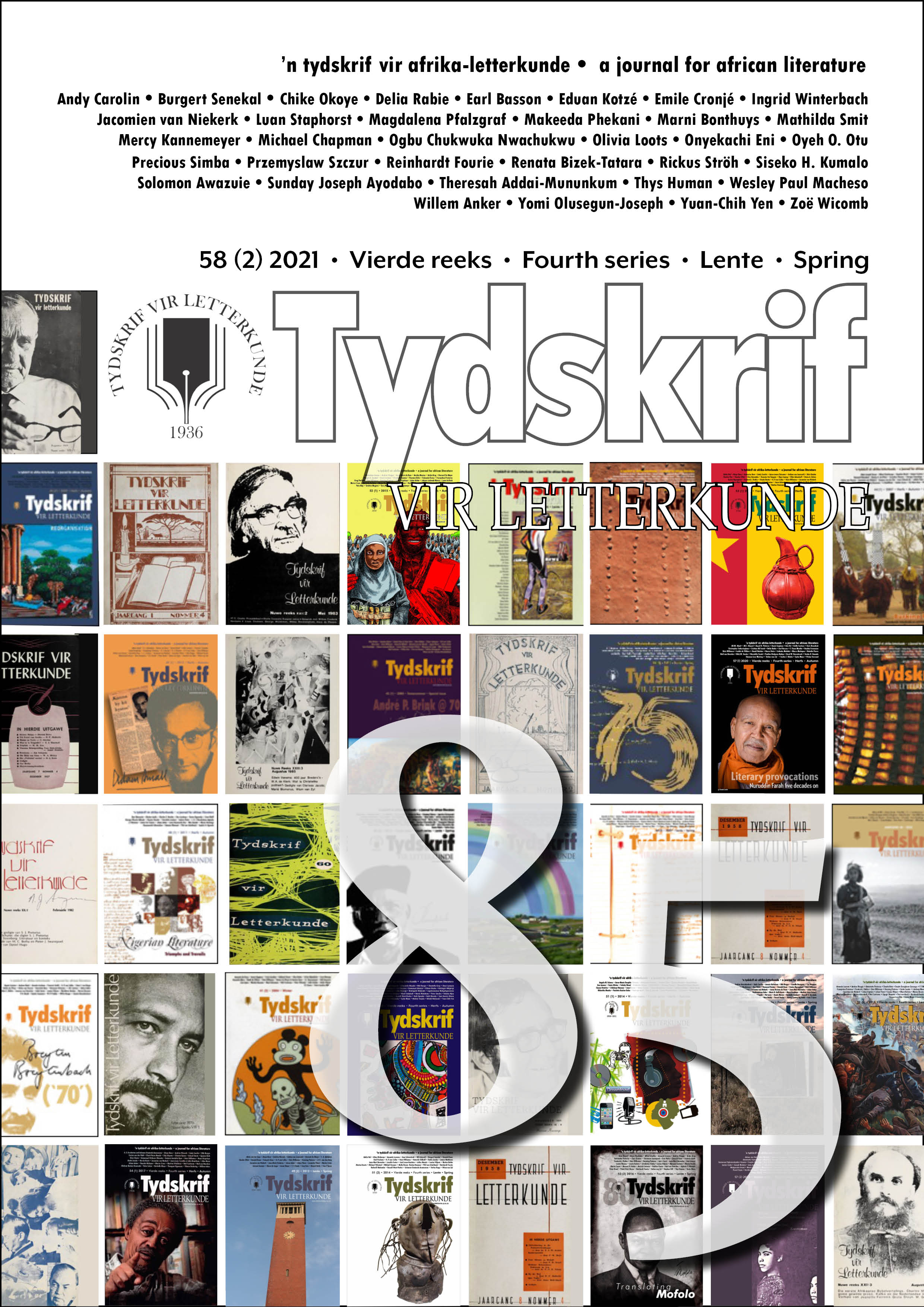The tender critique: Africa of the Congolese migrant writers in French-speaking Belgium
DOI:
https://doi.org/10.17159/tl.v58i2.10903Keywords:
migrant writing, French-speaking Belgium, Africa, Congo, critiqueAbstract
The article is dedicated to the portrayal of Africa in the writings of the French-speaking Belgian writers of Congolese origins. We analyse subjective representations of Africa, both critical and idealized ones, from which emerges a vision of the continent brimming with contradictions. On the one hand, it is an alluring, vast and fertile land with abundant flora and fauna, as well as clime and landscape dearly missed by migrant writers—the land embodying the concept of “paradise lost” or the notion of a nursing mother identified in the migrant writers’ texts with the idea of homeland. On the other hand, although abundant in natural resources, Africa appears to be the continent of extreme poverty, hunger, violence, racism, persecution and ethnic cleansing—the territory still exploited by global powers on which colonialism unveiled its new face defined by a seemingly neutral term, globalization. This dichotomous representation—a far cry from the simplified, impoverished visions of Africa offered by the European media—is conditioned by the specific existential situation of the migrant writers: remaining physically away from Africa, but still having a deep emotional, mental and cultural connection with their land, they are capable of perceiving it in a different light—thus, from a perspective which sharpens critical thinking and with tenderness resulting from the longing for their homeland. Hence, the circumstances of the migrant writers allow them to take an idiosyncratic, ambivalent, and intellectually-affective stance—a specific critical tenderness, or: tender critique—through the prism of which the writers depict African realities and which can perhaps change the perception of these realities in the consciousness of the European readers.Downloads
References
Aldrich, Robert. “Homosexuality in the French Colonies”. Homosexuality in French History and Culture, dirigé par Jeffrey Merrick & Michael Sibalis. Harrington Park, 2001, pp. 201–18.
Bofane, In Koli Jean. La Belle de Casa. Actes Sud, 2018.
Bofane, In Koli Jean. Congo Inc. Le Testament de Bismarck. Actes Sud, 2014.
Bofane, In Koli Jean. “Entretien avec In Koli Jean Bofane (28/11/2016)”. Fabula. Les colloques: Afriques transversales. http://www.fabula.org/colloques/document6348.php.
Cazenave, Odile. Afrique sur Seine. Une nouvelle génération de romanciers africains à Paris. L’Harmattan, 2003.
Chariatte, Isabelle. “L’autodétermination dans les romans d’In-Koli Jean Bofane—droit de réponse à la violence Postcoloniale.” Études de lettres no. 3–4, 2017, pp. 57–81. DOI: https://doi.org/10.4000/edl.2482.
Chevrier, Jacques. La Littérature nègre. Armand Colin, 1999.
Desorbay, Bernadette. “Le Congo des romanciers francophones de Belgique: pour une histoire poïétique de la modernité congolaise.” Études littéraires vol. 49, no. 2–3, 2020, pp. 227–44. DOI: https://doi.org/10.7202/1071494ar.
Djungu-Simba, Charles. La Chèvre, la corde et l’herbe au Congo-Zaïre. Genèse d’une passion d’écrire. L’Harmattan, 2002.
Faïk-Nzuji, Clémentine M. Si le Congo m’était conté. Jourdan, 2020.
Genette, Gérard. Seuils. Seuil, 1987.
Halen, Pierre. “La littérature congolaise: une première approche quantifiée grâce à LITAF.” Continents manuscrits no. 15, 2020. DOI: https://doi.org/10.4000/coma.6062.
Mambenga-Ylagon, Frédéric. “Les représentations de l’Afrique Centrale dans les littératures coloniales et francophones africaines face aux discours africanistes et aux enjeux institutionnels.” Synergies Afrique des Grands Lacs no. 6, 2017, pp. 11–26.
Marivat, Gladys. “En Afrique du Nord, il a des codes raciaux qui excluent les Noirs.” Le Monde Afrique, le 12 mai 2019. https://www.lemonde.fr/afrique/article/2019/05/12/en-afrique-du-nord-il-y-a-des-codes-sociaux-qui-excluent-les-noirs_5461175_3212.html.
Michel, Serge & Michel Beuret. La Chinafrique. Grasset, 2008.
Mouralis, Bernard. Les Contre-littératures. Herman, 2011.
Reggiani, Licia. “Du conflit à la fusion: Sang mêlé ou ton fils Léopold d’Albert Russo.” Cahiers francophones d’Europe Centrale-Orientale no. 7–8, 1997, pp. 221–30.
Reybrouck, David. Congo. Une histoire, traduit par Isabelle Rosselin. Actes Sud, 2014.
Riva, Silvia. Nouvelle histoire de la littérature du Congo-Kinshasa, traduit par Collin Fort. L’Harmattan, 2006.
Russo, Albert. Le Cap des illusions. Griot, 1991.
Russo, Albert. Léodine l’Africaine. Ginkgo, 2011.
Russo, Albert. “La moitié africaine de mon être.” Papier blanc, encre noire. Cent ans de culture francophone en Afrique Centrale (Zaïre, Rwanda et Burundi), t. 2, dirigé par Marc Quaghebeur. Labor, 1992, pp. 643–51.
Russo, Albert. Sang mêlé ou ton fils Léopold. Ginkgo, 2007.
Tshibanda, Pie. Un fou noir au pays des Blancs. Le grand miroir, 2007.
Tshibola Kalengayi, Bibiane. “Aspects de la littérature zaïroise de langue française (1945–1980).” Papier blanc, encre noire. Cent ans de culture francophone en Afrique Centrale (Zaïre, Rwanda et Burundi), t. 2, dirigé par Marc Quaghebeur. Labor, 1992, pp. 537–53.
Tshitungu Kongolo, Antoine. Te perdre et te retrouver. L’Harmattan, 2011.
Downloads
Published
How to Cite
Issue
Section
License
Copyright (c) 2021 Tydskrif vir Letterkunde

This work is licensed under a Creative Commons Attribution-ShareAlike 4.0 International License.


 https://orcid.org/0000-0001-6465-6584
https://orcid.org/0000-0001-6465-6584


.png)